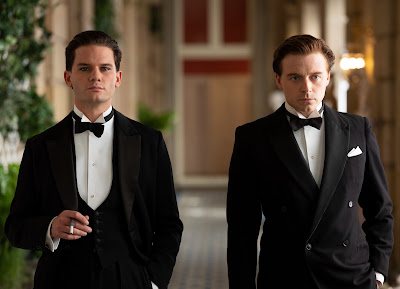Davies remains a stickler, and that very precision provides its own source of fascination: you keep scanning the frame to check if he's got the details and faces right, and invariably he has. From the very top: Lowden has been knocking around the British cinema without ever quite generating the buzz surrounding some of his immediate contemporaries. (He was happy to play second fiddle to Florence Pugh in 2019's Fighting with My Family.) Yet Davies appears to have seen in him an actor from another age entirely. Lowden has the dimpled chin of a young Richard Burton, but he carries himself in a way that harks back further still, to the Ronald Colman era of matinee idols. This truly is a performance that's had all the 21st century knocked out of it. At the Highland army base to which this Sassoon is sent for rehabilitation, Davies installs pariahs of the British film industry, performers who've sometimes found it hard to fit in: Ben Daniels as the doctor who has a deeper sympathy for his patient than most, Julian Sands as the CMO who has no time for anything less than maximum manliness. The screen gradually fills with melancholy men, weighing up whether it's better or worse to be out of the trenches and what to do with themselves now; whether they're ever likely to make their peace with a world that's battered them so brutally. Benediction shares with Davies's earlier work an eye for figures caught in a suspension of some kind: it's not trying to fit in the life and works entire, the eternal pitfall of the movie biopic, rather feeling out particular moments, and the people with whom Sassoon may have shared those moments. The camera keeps moving, however: it's how Davies counters the detachment and passivity of his protagonist. What it alights on are pockets of life, the first stirrings of a new and liberated world.
For one, Davies presents the younger Siegfried with a brilliant (and brilliantined) false start in Ivor Novello, played by Jeremy Irvine as a cross between Jimmy Carr and the Associates' Billy Mackenzie, while funnelling his director's waspish wit. (On Edith Sitwell's receding gums: "She's so autocratic I'm surprised she gave them permission.") The scenes between these two men carry us further into the 20th century, towards a situation Davies may himself have had to navigate, or at least one the filmmaker recognises and understands: the attraction felt by a sensitive, emotionally reticent young man (as Siegfried confesses to his doc, he's no risktaker) for a voraciously polyamorous, devil-may-care contemporary. The contrast between the film's Sassoon and Novello starts with their words - one man's as sincere as rocks, the other as fanciful as balloons - and extends outwards to their deeds, Ivor living out and proud, Siegfried retreating into marriage with Hester Gatty (Kate Phillips, another whose features suggest Rank and Gainsborough before they do Film4) in a bid to meet polite society's expectations of him. (Gradually, those Fifties scenes, with the cranky Capaldi and Gemma Jones as the older Hester, start to come into clearer focus.)
Arguably, the emphasis placed on the poet's personal life means his professional accomplishments suffer a touch in the edit. (The narration counteracts that, to some degree, but we otherwise have to rely on sporadic walk-ons from Simon Russell Beale as the journalist and critic Robbie Ross to let us know how well the books are selling.) And it's clear that Davies, even now, is being allotted modest resources to play with, well away from the Crowns, Downtons and Bridgertons of this world. (Do producers still not trust him with the silverware?) We get but a sketch of Soho and a rather hemmed-in ballroom scene; there are limited numbers of battlefield casualties in the hospital and guests at the wedding. The closing credits indicate this was, at least in part, a lockdown production, which may well have had some impact on the scale of this shoot. Yet some of these limitations actually work in Benediction's favour: this is, after all, a story about a man in a self-made bubble - someone withdrawing from company, fearful of contact - and the prevailing tightness refocuses our gaze on bodies, faces, emotions. The result is small but intimate and absorbing: a period drama that, for once, you feel you really could reach out and hold in the palm of your hand.
Benediction opens in selected cinemas from Friday.

No comments:
Post a Comment